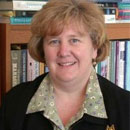Applied Mathematics
Students majoring in Applied Mathematics select a field of application, or a concentration in Elementary or Secondary Education. Students majoring in Applied Mathematics with a field of application complete at least twelve mathematics courses and at least six approved courses in a field in which significant applications of mathematics are possible. In consultation with an academic advisor, students may design a single-discipline or multi-discipline field of application from academic programs such as business, economics, education, environmental studies, fashion, graphic design, sociology, or exercise science. Students apply mathematics to their field in papers, projects, and courses that culminate in a Capstone Seminar and an Internship. Graduates receive a Bachelor of Arts in Applied Mathematics and are prepared for many career opportunities in almost every sector of the job market using mathematics for analysis, prediction, modeling, problem solving, and education.
The following goals and learning outcomes delineate what we strive for students to achieve when they complete the major program of study in Applied Mathematics.
Goal 1: Conceptualization
Upon completion of the major program of study in Applied Mathematics, students will be able to
- demonstrate understanding of principles, techniques, and applications in selected areas of mathematics
- identify mathematical concepts needed to solve problems
Goal 2: Organization
Upon completion of the major program of study in Applied Mathematics, students will be able to
- organize the principles and techniques of mathematics in a logical way to solve problems
- adapt and apply mathematical concepts to solve problems
Goal 3: Literacy skills
Upon completion of the major program of study in Applied Mathematics, students will be able to
- read and understand mathematical writing
- write using the notation and nomenclature of mathematics
- create mathematical charts, graphs, figures, and diagrams
Six courses in a Field of Application: 18 Credits
A Field of Application consists of six courses (approved by the Math/Science Chair) from another department at the College. An interdisciplinary Field of Application consists of six approved courses from two or more departments. Of the six courses, at least two must be at the 200-level or higher and at least one must be at the 300-level.
General Education Core Requirements and Remaining Unrestricted Electives: 62 Credits
Minimum Credits Required for Graduation: 120
| Course Code | Course Title | Credits |
|---|---|---|
| Core Courses | ||
| MATH205 | Calculus I | 4 |
| MATH206 | Calculus II | 4 |
| MATH208 | Statistics | 3 |
| MATH212 | Finite Mathematics | 3 |
| MATH307 | Calculus III | 4 |
| MATH320 | Differential Equations | 4 |
| MATH325 | Linear Algebra | 3 |
| MATH399 | Mathematical Applications | 3 |
| MATH499 | Internship | 3 |
| Choose 3 from the following: | ||
| MATH207 | Applied Trigonometry | 3 |
| MATH210 | Math Applied to Science | 3 |
| MATH328 | Mathematics Applied to Management | 3 |
| MATH330 | Mathematical Modeling | 3 |
| MATH338 | Mathematical Statistics | 3 |
Six courses in a Field of Application: 18 Credits
A Field of Application consists of six courses (approved by the Math/Science Chair) from another department at the College. An interdisciplinary Field of Application consists of six approved courses from two or more departments. Of the six courses, at least two must be at the 200-level or higher and at least one must be at the 300-level.
General Education Core Requirements and Remaining Unrestricted Electives: 62 Credits
Minimum Credits Required for Graduation: 120
ANTH103 - Human Origins
This course considers the morphological, behavioral and life history features that distinguish the primates from other mammals, and the hominoids from other primates. We begin with an overview of the primates and their behavioral ecology, and then explore in detail the adaptations of each of the major groups of extant primates. Finally, we apply our knowledge of morphology and behavioral patterns in living primates to the fossil record.
ENV211 - Environmental Science
During this course, students are introduced to the concept of environmental sustainability. Issues such as climate change, biodiversity, food and agriculture, water resources, and energy are explored. Students are challenged to consider the impact of Lasell College on the environment and will complete a greenhouse gas inventory. Students also examine the role of science and technology in the pursuit of environmental sustainability.
ENV220 - World Geography
This course surveys the earth's social, cultural and economic patterns and their relationship to the physical geography of the earth. A regional approach is taken to provide a foundation for more intensive systematic studies of important environmental/political issues.

Jeffrey Corcoran
Associate Professor, Marketing and Management
Office: DeArment House
Email: jcorcoran@lasell.edu

Janet Huetteman
Graduate Chair of Management and Marketing; Associate Professor of Marketing
Office: 23 Maple Street, Office #5
Email: JHuetteman@lasell.edu

Matthew Reilly
Chair of Business and Interim Chair of Sport Management; Assistant Professor of Business
Office: DeArment
Email: MReilly@lasell.edu

Donna Scipione
Assistant Professor of Accounting and Finance
Office: DeArment
Email: dscipione@lasell.edu

Nancy Waldron
Assistant Provost; Professor of Entrepreneurship and Management
Office: DeArment
Email: nwaldron@lasell.edu

Robert Zuar
Visiting Assistant Professor of Accounting and Finance
Office: DeArment
Email: RZuar@lasell.edu


